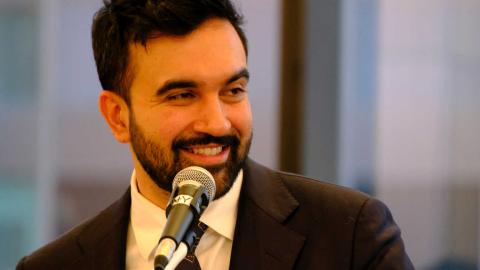Deportation Fallout: Suffering Children Left Behind
MIAMI -- Whether or not lawmakers reach a deal on immigration reform this year, one group is likely to suffer: the children of those deported.
The Pew Hispanic Center recently estimated that more than 150,000 U.S. citizen children are missing at least one parent who's been deported.
It's not known how many undocumented children have lost a parent.
What about the Kids?
Pastor Obed Jauregui leads Miami Bethany Church of the Nazarene and Miami Bethany Community Services. He said helping families suffering in the wake of deportation is an on-going ministry need.
"I think almost every month we have a family that's facing the deportation of a family member," he told CBN News. "The police usually pull them over for simple things like not using their turn signal or not making a stop."
Once people are detained, Pastor Obed said they're almost always deported.
For him, one of the most painful aspects of deportation is watching the effect on children who typically become fearful and suffer from a sense of abandonment.
"I have seen kids literally get sick," he said. "Their immune system shutting down and getting illnesses they never had before-different physical problems. Others have had serious emotional problems."
"I have seen kids get profoundly depressed and a lot of times end up with drug problems," he said.
Tearing Families Apart
Miami is one of the centers of the country's deportation crisis. Under the Obama administration, the overall numbers have spiked. Since 2008, the government has deported close to 2 million people.
Child advocacy groups estimate that 23 percent of those are parents.
Wendy Cervantes, vice president of Immigration and Child Rights Policy at First Focus, a Washington, D.C. advocacy group, said it's a tragedy that many people struggle to understand.
"What I hear a lot is that people just don't believe the government is deporting parents and separating families," she told CBN News. "They just can't imagine that it's happening to the extent that it is."
Kevin's nightmare came true two years ago when officers pulled his dad over. His father had been driving to church when he neglected to use his turn signal at a stop.
Pastor Obed took him to see his dad a few times in the detention center in Miami before he was deported to El Salvador.
"After he was deported it just didn't feel the same," Kevin explained. The eighth grader said, "My mom, I'd always see her sad. My brother would always look out the window waiting for him to come. And then I had a little baby sister he never met."
Chris was just 8 years old the Sunday morning that two officers knocked on the door of his home.
"My mom started crying," he explained. "My dad started getting closer to me, started putting me behind him. I was too small to understand what was going on."
Life without Parents
Chris now believes that the officers intended to take both his parents, but relented when they saw him, taking only his dad.
As a high school junior now, he's a successful student on track to graduate with not just his high school diploma, but an associates degree from his community college as well.
He immerses himself in a variety of extra-curricular activities at school, but says he longs for the day when his dad will return.
"As you grow up you start to realize you're missing a father figure to tell you 'Don't' do that' -- give you some advice and stuff," he said.
Cecia and her brother have faced the unimaginable: the government deported both their parents. The high school senior lost her mom in 7th grade and her dad last fall.
"It was just another shock because they had already taken my mom and I didn't really know what was going to happen," she said.
Cecia and her brother now live with a family friend.
Fight to Reunite
For Cecia, Kevin, Chris, and other children of deportation, the pain of separation is profound and difficult to explain. The task of re-uniting is no less challenging.
Kevin's father originally planned to bring his family back to El Salvador, but decided against the idea as he witnessed growing gang violence and feared for Kevin's safety.
Chris's dad has tried to re-enter legally for years but has struggled with illness and paperwork problems. He is still hopeful.
"One of the big things I've always dreamed about is [for him] to come back and see me graduate from high school. That's one of the big things I want him to come for," he said.
Abandoned, Traumatized
Cecia has earned top grades in her international baccalaureate program and hopes to study medicine. She said she fears returning to Nicaragua, the country she left behind as a 1 year old.
"I would like to live life as a normal person," she explained. "Be able to graduate and be able to get into a college and just continue even though all this has happened."
Cervantes and other child advocates say research is emerging that shows the scope of suffering that children of deportation endure. It includes post-traumatic stress disorder symptoms and declines in physical health and educational outcomes.
"It affects their mental and physical health, their ability to do well in school and it also has a very serious impact on their economic security," Cervantes said.
Cervantes and other child advocates would like to see immigration reform focus on more humane treatment of children. They're especially interested in better coordination between the immigration and child welfare systems, which would ease the way for detained parents to make decisions about their children and ultimately could prevent the government from placing their children in foster care.
Current estimates show more than 5,000 children have been placed in foster care after one or both of their parents were deported.
Reform for the Children
Already there is some discussion on Capitol Hill around reform for so-called "Dreamers," children brought into the country illegally by their parents.
The Obama administration began the deferred action program in 2012, which allows these children to live and work legally under two-year renewable waivers. Further protections are being discussed.
Pastor Obed prays for reform, even as he acknowledges that entering the country illegally is unbibilical.
He said he hopes that compassion will lead to a fair way for families to stay.
"I've asked around the congregation and families are willing to pay anything," he said. "If the fines were $10,000 they are willing to pay it. We are talking about a family willing to work for many years to pay whatever the government asks for as long as they don't have to go back to their country."
In the meantime, the new normal for Kevin is life without his dad. He said sports keep him going-and the daily phone call his mom receives from his "papi."
"It's not like they got divorced so there's still that hope and faith that they're going to get back together," he said. "And we're all going to get together."




